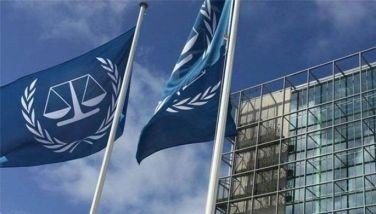Arroyo endorses 5 energy bills

August 25, 2004 | 12:00am
President Arroyo endorsed yesterday to the 13th Congress for immediate passage into law five proposed energy independence and savings bills to lessen the country’s dependence on imported crude oil.
The recent round of increase in crude oil prices, which now reaches more than $46 per barrel in the world market, triggered corresponding increases in domestic prices of gasoline and other refined oil products.
In the press briefing at the Palace yesterday at the end of the Legislative-Executive Development Advisory Council (Ledac) meeting convened by the President in Malacañang, Energy Secretary Vicente Perez said that the five bills were drawn up by the Department of Energy (DOE) to realize the administration’s goal of reducing the country’s dependence on crude oil.
The five bills were: the proposed franchise bill for the Transmission Company (Transco); the Natural Gas bill which will lay the groundwork for using cleaner fuel such as natural gas; the Renewable Energy bill that seeks to tap wind, bio-mass, solar and ocean waves as energy sources; the Alternative Transport Fuel bill, which promotes the use of alternative fuel particularly ethanol, a fuel derivative from sugarcane and cassava; and an Enforcement bill which aims to protect household consumers from the illegal practices of traders of imported liquefied petroleum gas (LPG).
"Those were the five legislative agenda of Mrs. Arroyo," Perez said, "but our meeting at the Ledac was centered on energy conservation measures because it is more urgent."
"It (energy conservation) is the short-term solution to the sudden rise in oil prices but the long-term goal is energy independence by improving our oil and gas resources," Perez pointed out.
Among the five energy bills, the Alternative Transport Fuel bill was "very popular" among lawmakers who attended the Ledac meeting, Perez said.
"There are lot of sugar industries in their (congressional) districts and this is something that the executive side is willing to embrace," Perez explained.
"There was also a lot of clamor from LEDAC members to develop our oil and gas resources, geothermal resources, renewable energy, our coal industry and this alternative transport fuel," he noted.
Earlier this month, the President vowed to carry out her administration’s reform package on energy aimed at increasing the country’s reserves of indigenous oil and gas supply. This would be implemented by the state-run Philippine National Oil Co. and its subsidiary, the PNOC-Energy Development Corp.
Mrs. Arroyo and Vice President Noli de Castro would extensively discuss these energy independence measures and conservation program in her pulong bayan (town hall meeting) this morning in Quezon City.
In yesterday’s press conference, Perez also said that the Ledac did not take up the demand for the repeal of the amendment of the controversial Oil Deregulation Law, which is now being blamed for the uncontrolled spiraling of domestic prices of gasoline and other refined oil products.
He assured though that the proposed review of the Oil Deregulation Law is welcome.
"It’s good to have all issues on the table, invite all players to express feelings and if they feel that there are certain imperfections, then I think that is something that legislators may take up," Perez said.
The recent round of increase in crude oil prices, which now reaches more than $46 per barrel in the world market, triggered corresponding increases in domestic prices of gasoline and other refined oil products.
In the press briefing at the Palace yesterday at the end of the Legislative-Executive Development Advisory Council (Ledac) meeting convened by the President in Malacañang, Energy Secretary Vicente Perez said that the five bills were drawn up by the Department of Energy (DOE) to realize the administration’s goal of reducing the country’s dependence on crude oil.
The five bills were: the proposed franchise bill for the Transmission Company (Transco); the Natural Gas bill which will lay the groundwork for using cleaner fuel such as natural gas; the Renewable Energy bill that seeks to tap wind, bio-mass, solar and ocean waves as energy sources; the Alternative Transport Fuel bill, which promotes the use of alternative fuel particularly ethanol, a fuel derivative from sugarcane and cassava; and an Enforcement bill which aims to protect household consumers from the illegal practices of traders of imported liquefied petroleum gas (LPG).
"Those were the five legislative agenda of Mrs. Arroyo," Perez said, "but our meeting at the Ledac was centered on energy conservation measures because it is more urgent."
"It (energy conservation) is the short-term solution to the sudden rise in oil prices but the long-term goal is energy independence by improving our oil and gas resources," Perez pointed out.
Among the five energy bills, the Alternative Transport Fuel bill was "very popular" among lawmakers who attended the Ledac meeting, Perez said.
"There are lot of sugar industries in their (congressional) districts and this is something that the executive side is willing to embrace," Perez explained.
"There was also a lot of clamor from LEDAC members to develop our oil and gas resources, geothermal resources, renewable energy, our coal industry and this alternative transport fuel," he noted.
Earlier this month, the President vowed to carry out her administration’s reform package on energy aimed at increasing the country’s reserves of indigenous oil and gas supply. This would be implemented by the state-run Philippine National Oil Co. and its subsidiary, the PNOC-Energy Development Corp.
Mrs. Arroyo and Vice President Noli de Castro would extensively discuss these energy independence measures and conservation program in her pulong bayan (town hall meeting) this morning in Quezon City.
In yesterday’s press conference, Perez also said that the Ledac did not take up the demand for the repeal of the amendment of the controversial Oil Deregulation Law, which is now being blamed for the uncontrolled spiraling of domestic prices of gasoline and other refined oil products.
He assured though that the proposed review of the Oil Deregulation Law is welcome.
"It’s good to have all issues on the table, invite all players to express feelings and if they feel that there are certain imperfections, then I think that is something that legislators may take up," Perez said.
BrandSpace Articles
<
>
- Latest
- Trending
Trending
Latest
Trending
Latest
Recommended





























